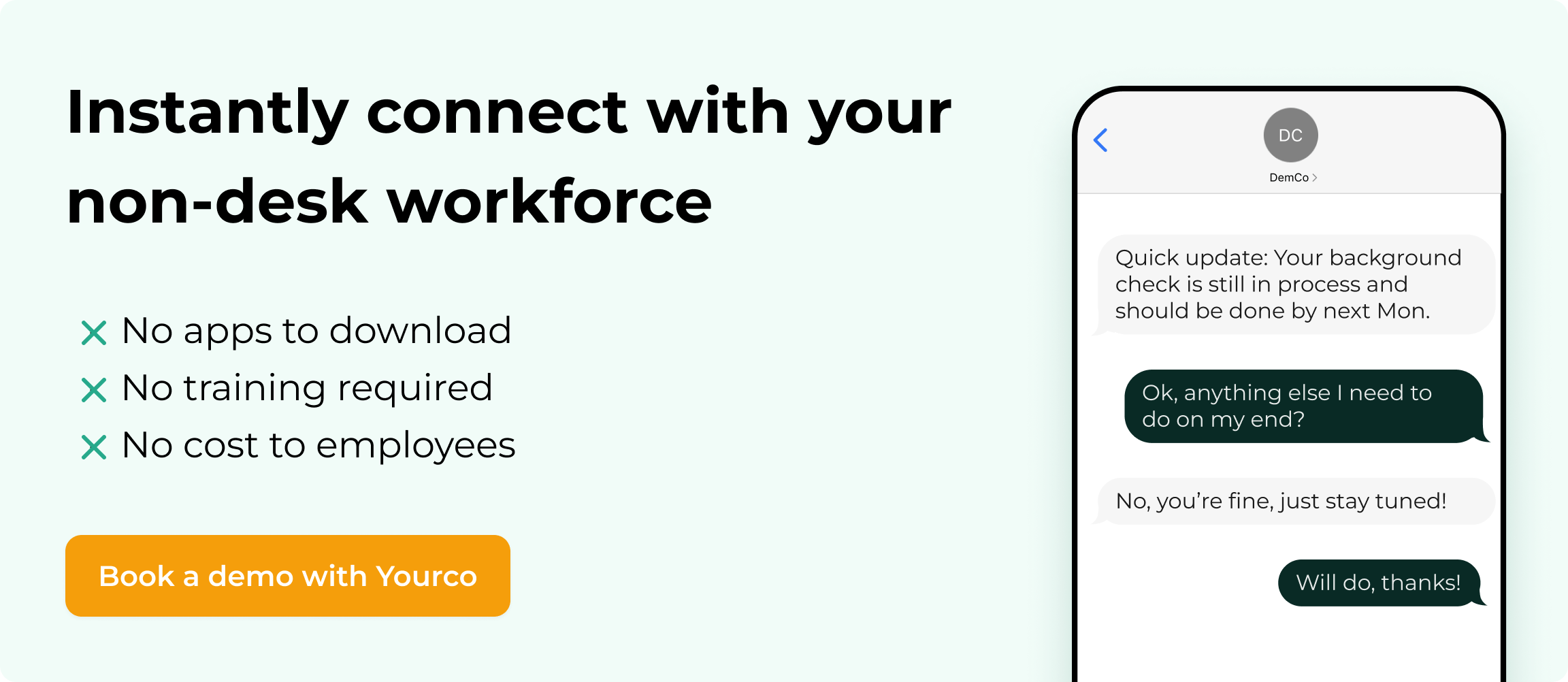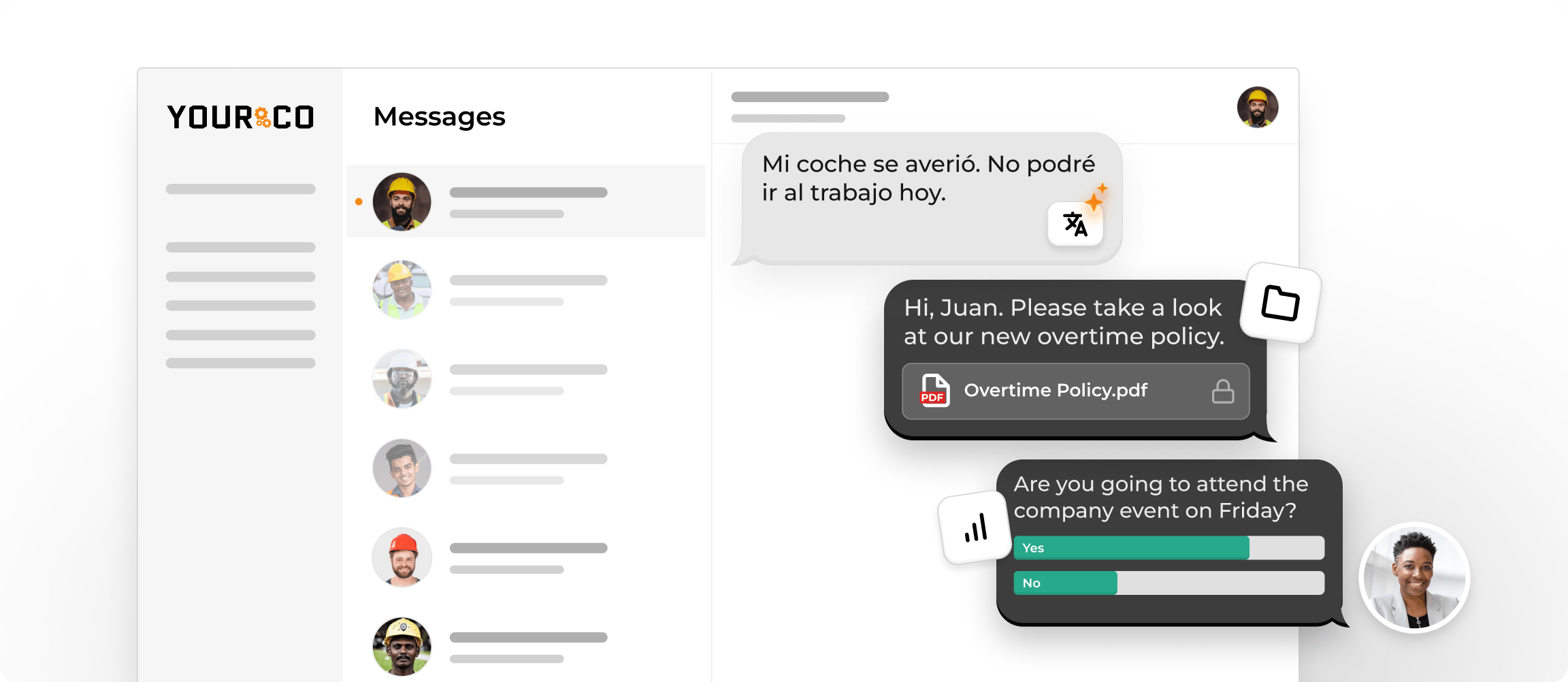How to Fix and Prevent Workplace Communication Breakdowns in Hospitality


When messages miss the mark, everyone feels it: guests, employees, and your bottom line. A single lost note can leave a family waiting in the lobby for a "clean" room that housekeeping finished an hour ago, or delay a repair that puts safety at risk, turning what should be a seamless stay into a negative review.
Hospitality teams face unique hurdles: operations never stop, departments juggle overlapping tasks, and staff often speak different languages across multiple shifts. Without clear, reliable communication channels, gaps widen fast. Rooms sit empty, maintenance backlogs grow, and frustrated staff look for new jobs, eroding service quality and driving costs higher.
Strong, streamlined communication reverses that trend, turning real-time updates into faster turnovers, safer properties, and happier teams. In this guide, you'll see practical steps to spot weak links, pick the right channels, and build accountability that keeps every guest promise on track.
The Real Cost of Poor Hospitality Communication
When messages don't reach the right people, you see the impact everywhere, from frustrated guests at the front desk to rising labor costs in the back office.
Guest Experience Failures
A single missed message can ruin an otherwise perfect stay. When housekeeping finishes a room, but the front desk never gets the update, check-in gets delayed, guests wait in line, and everyone feels the stress. These delays, caused by simple communication silos, quickly become negative reviews that stay online long after the guest checks out.
You also miss upselling opportunities: if the bar finds out too late that a couple is celebrating their anniversary, the chance to offer champagne is gone.
Unreported maintenance issues create bigger problems. A loose balcony rail that doesn't get flagged to engineering isn't just inconvenient — it's dangerous. Add billing mix-ups and checkout disputes that trace back to unclear handoffs, and you've turned what should be a smooth guest experience into a series of frustrating roadblocks.
Operational Inefficiencies
Poor information flow wastes time you can't get back. Housekeepers end up cleaning the same room twice because status updates are written on sticky notes instead of shared instantly, wasting both wages and supplies. When engineering doesn't get repair tickets fast enough, that broken hot tub stays out of order, cutting your amenities and sending guests to competitors.
Scheduling systems that don't sync with real-time updates create double bookings that leave staff scrambling and guests unhappy. You also end up over-ordering linens or running out of minibar items because inventory counts get shared late or not at all.
All of this drives up labor costs because teams spend their shifts fixing problems instead of delivering great service.
Staff Turnover and Safety Risks
People quit when they feel left out of the loop. Missing updates during shift changes makes employees wonder if anyone values their time, creating frustration that speeds up turnover in an industry struggling to keep staff. Night crews often start their shifts with no clue what happened during the day—if a guest slipped near the pool, those crucial safety details can disappear between shifts, making repeat accidents more likely.
Compliance suffers too. Without clear, documented procedures, housekeeping might skip required chemical safety checks, or maintenance could miss lockout steps, exposing you to costly violations. During emergencies, every second matters, and broken information flow can turn a manageable situation into a full crisis.
Common Communication Failures in Hospitality Operations
Even well-run hotels struggle when messages get stuck between departments, shifts, or multiple locations. Here's where gaps show up most often and how they quietly cost you time, wages, and guest satisfaction.
Department Coordination Breakdowns
When front desk staff rely on sticky notes and housekeeping uses walkie-talkies, information gets trapped in separate departments. These barriers grow during shift changes. Night staff might leave a handwritten note about a leaking faucet, but the morning team never sees it. The room stays out of order, and you lose revenue.
Outdated tools make things worse. Paper logs disappear, and radios can't reach staff who are out of range. During rushed handovers, important details slip through the cracks. This creates double work, guest delays, and safety risks that could have been prevented with better information flow.
Multi-Property Management Challenges
Running multiple hotels turns small problems into big headaches. Corporate sends an email about new check-in procedures, but night auditors at two locations never read it. The next morning, guests get conflicting instructions. Each property starts creating its own workarounds when messaging fails, which hurts your brand consistency.
Coverage becomes a nightmare when you can't see staffing levels across locations. A supervisor at one hotel has no idea that another property is short-staffed for a wedding group. During emergencies, scattered systems slow down your response time and increase guest compensation costs. Without a single source of reliable information, you spend more time chasing updates than taking care of travelers.
Guest-Staff Communication Gaps
Guests feel every internal breakdown. A maintenance request goes from a room tablet to the front desk but never reaches the engineering team. The air conditioner stays broken and the guest complains on social media.
Special guest needs follow the same broken path. One clerk notes a guest's feather allergy, but housekeeping gets a standard cleaning order. The guest wakes up having an allergic reaction. Simple requests like late checkout for VIP guests disappear when staff schedules change. Each missed message damages trust and creates negative reviews that hurt your reputation.
Build Effective Communication Systems for Hospitality Teams
Before new tools or policies solve your headaches, you need a clear system that moves the right message to the right person at the right moment. The three steps below give you a practical framework you can start using this week.
Select Communication Channels That Work Across Properties
Start by mapping every place information travels today: front desk binders, walkie-talkies, email chains, and note where updates regularly stall. When comparing your options, ask yourself two simple questions:
- "Will every employee see this fast?"
- "Can it work in a basement laundry room as easily as a guest suite?"
SMS checks both boxes perfectly. Text alerts reach almost any phone and get opened within minutes, making them ideal for room-ready notices or safety warnings. Since every employee receives text messages, SMS works without downloads, logins, or Wi-Fi dependencies that create barriers for staff working throughout the property.
Email is still useful for things like invoices, weekly schedules, or brand memos that employees can check when they have time.
Mobile apps promise rich features, yet hospitality teams using task tracking and productivity systems show many users abandon downloads rather than install another program on their personal devices. For frontline employees who often share devices, mandatory apps create another barrier instead of removing one.
Stick with SMS for anything urgent, save email for reference material, and skip anything that requires downloads.
Design Messages for Maximum Clarity and Action
Even the best system fails when the messages themselves confuse people. Create short templates for your most common scenarios so no one wastes time trying to decode what you need. A maintenance alert should include room number, specific issue, urgency level, and a photo link—details that prevent engineers from playing phone tag to understand the problem.
Instead of sending "AC not working in 314," try "Room 314—AC blowing hot air, guest in room, priority 1. Photo attached."
The difference saves multiple back-and-forth messages that often push simple fixes into the next shift, frustrating both staff and guests.
Tag each template with plain-English priorities like "Now," "Today," or "This Week" so staff instantly understand how to schedule the task. When you remove guesswork from your messages, teams can focus on speed and service instead of trying to interpret what you meant.
Create Accountability and Confirmation Processes
Every critical message needs to leave a trail you can follow. Digital systems that show when a text was delivered, opened, and acted on give you proof that safety instructions or VIP requests reached the right person at the right time.
Set clear response windows that make sense:
- Five minutes for fire-alarm checks
- Fifteen for guest complaints
- End-of-shift for routine restocking
When someone completes a task, their update should be visible to everyone who needs to know. A simple "Room 210 shower fixed, 2:17 p.m." in the same thread eliminates duplicate calls and "I thought you had it" confusion that wastes valuable time. Keep these records for at least one audit cycle so you can verify training compliance or investigate incidents without digging through scattered radio logs.
With confirmation rules in place, you transform loose suggestions into accountable actions that staff trust and guests notice. Your team stops wondering if their message got through and starts focusing on delivering the service your guests expect.
Overcome Hospitality-Specific Communication Barriers
Clear updates mean nothing if they disturb guests, confuse multilingual staff, or disappear during night shifts. Your messaging needs to respect guest privacy, work across language barriers, and function around the clock.
Navigate Guest Privacy and Professional Standards
Guests notice every beep and radio chatter. Loud conversations in hallways break the calm atmosphere they expect. Text alerts keep your team informed without disrupting the guest experience. When sharing room updates or maintenance needs, stick to basics: room number, task, and deadline. This protects guest privacy and prevents sensitive details from spreading.
Simple message templates prevent confusion: "Room 412, faucet leak, respond by 3 p.m." Staff can confirm receipt without making calls or having hallway conversations. This quiet information flow keeps your team looking professional while guests stay comfortable.
Support Diverse, Multi-Lingual Teams
When your team speaks five languages but instructions come in one, mistakes happen. Missed allergy notes, wrong room deliveries, and safety lapses all trace back to language barriers. Use tools that translate messages into each person's preferred language.
Keep messages short and specific to improve translation accuracy. Pair text with universal cues like room numbers, color-coded labels, or photos. For safety procedures or critical policies, send messages in multiple languages side by side. Check translations regularly with bilingual staff to catch errors that software misses. When everyone can read and respond easily, service improves, and your team feels included.
Address 24/7 Operational Challenges
Hotels never close, but information often gets stuck at shift changes. Night crews miss VIP arrivals, maintenance issues go unfinished, and guest complaints pile up. These gaps frustrate visitors and slow repairs.
Establish one channel that works whether staff are in basement laundry rooms or rooftop bars. Timestamped messages create a running record, so the 11 p.m. supervisor sees everything the day manager started. Schedule automated reminders for recurring tasks: pool testing at 6 a.m., banquet setup at 4 p.m. Documented updates replace guesswork and keep every shift aligned.
Implement Better Hospitality Communication Step-by-Step
You can't fix every gap at once, so tackle them in a clear sequence—start with the moments that shape guest satisfaction, train the people who set the tone, then measure results and refine.
Start with Guest-Critical Communication Needs
Begin by mapping the guest journey from reservation to checkout. Flag the points where silence or mixed signals cost you five-star reviews. When front desk agents wait on housekeeping to confirm room readiness, guests sit in the lobby, and frustrations mount. Pull recent reviews and service tickets to spot these pain points.
Next, set up a quick way to handle urgent issues. A burst pipe that never reaches the right engineer can wipe out revenue for multiple rooms. Create an always-on channel—SMS works best—for life-safety alerts. Require a read-back so you know the message landed.
Finally, create simple templates for high-impact updates: "Room 512 ready," "Elevator 2 out of service," or "VIP allergy alert." Clear, repeatable phrasing removes guesswork and speeds action. Your team will thank you for the clarity.
Train Managers and Department Leaders
New tools fail if supervisors fall back on handwritten notes. Hold a focused workshop with every department head before rollout. Open with a real scenario, for example, a room blocked twice because status updates died at shift change.
Walk managers through message priorities: safety, guest impact, and routine tasks. Agree on response windows for each tier and practice escalating an issue from housekeeping to engineering in under two minutes. Use live role-play so leaders experience both sending and acknowledging messages.
Show how the system logs read receipts. That way, no one can claim they "didn't hear the radio." Give each manager a quick-reference card with three steps to send an alert, two to confirm, and one to close the loop. Schedule follow-up sessions so new supervisors learn the protocol on day one.
Monitor Results and Continuously Improve
Once your system is live, track what matters. Watch guest satisfaction scores and note any comments about speed of service—rising ratings confirm your fixes are working. Pair those numbers with hard data like maintenance response times.
For a broader view, monitor occupancy, ADR, and RevPAR trends on your PMS dashboard. Review platform analytics weekly: unread messages, average reply times, and the shifts with the most missed acknowledgments. Share the findings in a short digest so teams see the impact.
Revisit templates and rules each season; holiday staffing surges or a new wing opening can change traffic patterns overnight. Small tweaks keep the system aligned with real-world operations and prevent old habits from creeping back.
Streamline Hospitality Communication with Yourco
Effective messaging connects every solution we've discussed. Reliable channels, clear updates, and proper follow-through eliminate the delays and silos that hurt service quality. When departments depend on paper notes or walkie-talkies, room-readiness updates disappear and guest requests stall.
Yourco solves these problems in one step. Since every employee receives text messages, Yourco's SMS approach reaches housekeepers on service carts, engineers in basements, and night auditors during overnight shifts—no downloads, logins, or Wi-Fi needed. Automatic translation helps multilingual teams read instructions in their preferred language, while two-way texting confirms completed tasks and answers questions instantly. This means fewer missed handoffs, faster maintenance responses, and smoother guest experiences.
Ready to see improved coordination and happier guests? Try Yourco free today or schedule a demo and see the difference the right workplace communication solution can make in your company.
Frequently Asked Questions
How can hospitality operations improve communication without disrupting guest experiences?
Keep things quiet and seamless. Text messages work perfectly because they reach staff instantly without crackling radios or loud announcements that ruin the guest experience. Your housekeeping team gets room updates silently, and front desk staff can coordinate guest services without any visible disruption. Since texts work on any phone, everyone stays connected while guests enjoy their stay undisturbed.
What's the best way to coordinate communication between housekeeping, maintenance, and the front desk?
Stop the guessing game between departments. Set up a shared system where everyone sees room status, work orders, and guest requests in real time. When shifts change, new staff can check what happened instead of playing telephone with the previous team. This cuts down on duplicate work and prevents important tasks from falling through the cracks.
How do properties communicate with staff who speak different languages?
Make language barriers disappear with automatic translation. Write your message in English, and the system translates it instantly for Spanish- or French-speaking team members. Keep messages simple and clear—"Room 214 needs fresh towels"—so there's no confusion. Staff can even reply in their preferred language, making everyone feel included and understood.
Which messages need to be immediate, and what can wait for shift meetings?
Send anything affecting guests right now through instant text—safety alerts, room readiness, VIP arrivals, or equipment problems. Save routine updates like schedule changes or policy reminders for shift meetings or printed notes. When you match the urgency to the right channel, your team knows what needs immediate attention and what can be handled later.
How can managers verify that critical safety information reached every shift?
Create a simple confirmation system. When you send important safety updates, the system shows who read the message and when. Ask for a quick "Got it" reply or have staff check off completed tasks on a digital list. This gives you proof that everyone, including the overnight crew, received and understood critical information.




